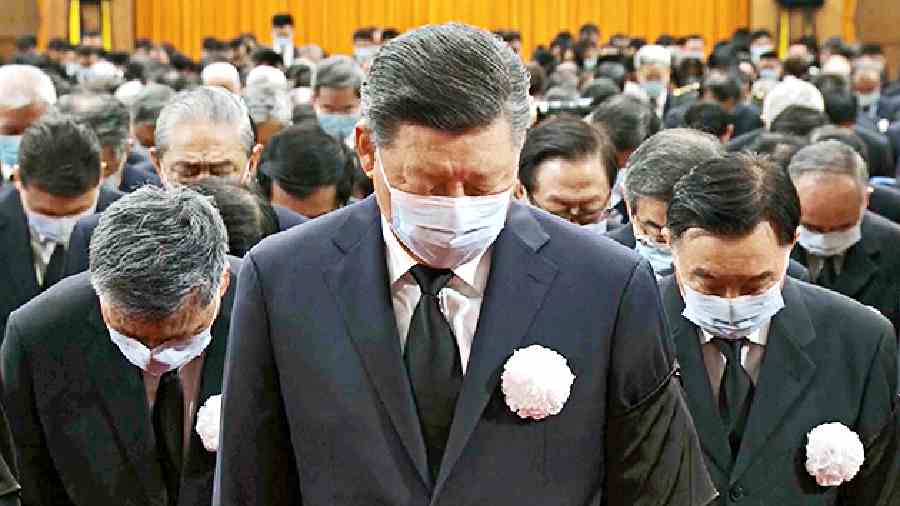China’s top leader, Xi Jinping, heaped praise on the late former President, Jiang Zemin, on Tuesday in a show of unity among the ruling elite just over a week after nationwide protests challenged Beijing’s authority.
Despite its atheism, the ruling Chinese Communist Party sends off its deceased leaders with a near-religious solemnity, and its ceremony to commemorate Jiang, who died Wednesday at 96, was no exception.
Xi delivered a 51-minute eulogy for Jiang that was full of accolades while avoiding hints of any personal and political differences between the two leaders.
“We love and esteem Comrade Jiang Zemin and cherish the memory of Comrade Jiang Zemin because he devoted his heart and soul and his energies all his life to the Chinese people,” Xi said at a memorial ceremony in the Great Hall of the People in Beijing.
The event was attended by thousands of officials, soldiers and dignitaries, who sat in the audience, wearing masks.
Even as the party sought to demonstrate solidarity within its ranks, the masks were a visual reminder of the coronavirus pandemic controls that prompted protests across China.
The demonstrations against China’s exceptionally stringent “zero Covid” policy of lockdowns erupted across the country in late November, sometimes escalating into calls for Xi and the party to step down.
The Chinese government has started easing some of the pandemic measures that fanned public anger, even as coronavirus infections keep rising.
Beijing said on Tuesday that it would no longer require residents to show negative Covid test results to enter supermarkets, shopping centres, the city’s main airport and other public places.
The protests were the most widespread and boldest in China since 1989, and especially an affront to Xi, who has tightened the party’s grip over society and gone to great lengths to quash dissent in his first decade in power.
At this delicate time, the funerary events for Jiang also gave Xi a chance to press the leadership and the country to rally around himself, analysts of Chinese politics said.
Many of the rituals to mark former Chinese leaders’ deaths are prescribed in rules developed over decades in marking the passing of Mao Zedong, Deng Xiaoping and other party titans.
But the tributes for Jiang were by some measures similar to those for Deng, one of the founding revolutionaries of Communist China and a much more weighty figure in Chinese history, said Deng Yuwen, a former editor at a Communist Party newspaper who now lives in the US. Xi’s eulogy on Tuesday was about as long as the eulogy that Jiang delivered for Deng Xiaoping when he died in 1997.
“With Jiang’s passing, it was a given that he’d receive high honours, but I guess that the level of it was a surprise to many people,” Deng said in a telephone interview.
“In a sense, this is also hinting that outsiders who take to the streets will not have an opportunity to split the party leadership.”
The mourning for Jiang also implicitly signified the end of an era in Chinese politics when he and other party elders remained, even in retirement, powerful back-room players.
After Jiang relinquished his last major post, as the party’s military chairman, in 2004, his protégés perpetuated his influence on politics.
Sometimes called the “Shanghai gang” after Jiang’s longtime base, they constrained his successor Hu Jintao, and helped Xi to emerge as Hu’s successor, many experts and insiders say. But Jiang’s influence waned over the past decade, and after Hu retired in 2012, he, too, retained little sway. At a party congress in October, Xi swept aside Hu’s remaining protégés, including Premier Li Keqiang, and installed a new top leadership that entirely dominated his own loyalists.
“Jiang Zemin’s passing signifies that this old-man politics is completely over,” Deng said.
“It was over before now, but his passing is an even more powerful symbol of that.”
The carefully planned rituals began as soon as state media announced Jiang’s death last week.
Xinhua, the main official news agency, issued a glowing tribute to Jiang. Chinese news websites and major newspapers switched their colour to mournful monochrome.
In Shanghai, where Jiang died, a motorcade escorted his body to an airport, where it was flown to Beijing.
Since then, party newspapers have published tributes to Jiang.
New York Times News Services










